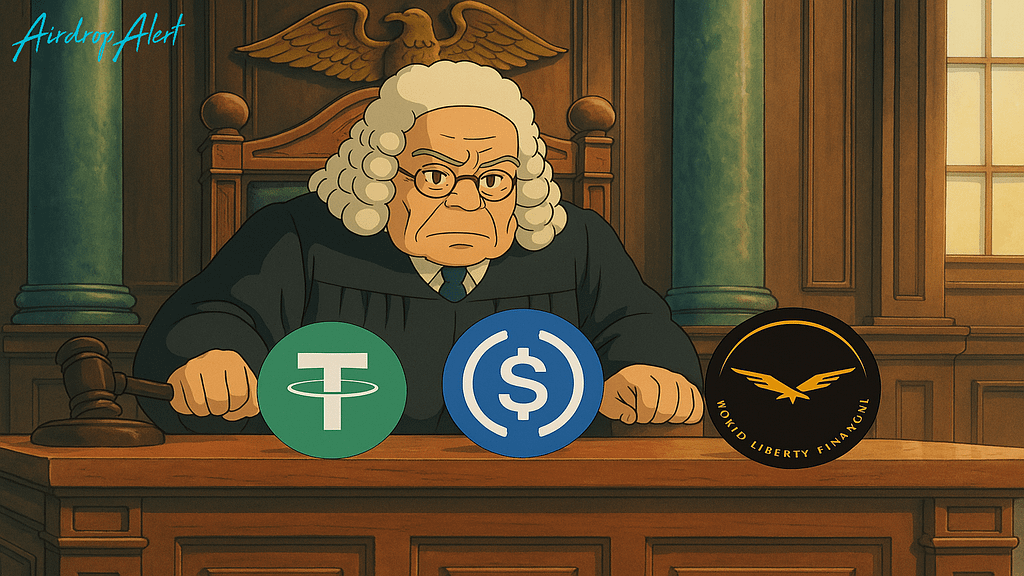We always keep you updated with the most important crypto news and airdrop developments. But this time, the update was too important to just blend into a regular blog post. The GENIUS Act — a groundbreaking stablecoin bill passed by the Senate — deserves a blog of its own, especially because this bill could be a major win for airdrop farmers across the board.
What Is the GENIUS Act?
The GENIUS Act, short for Guiding and Establishing National Innovation for U.S. Stablecoins, is the first stablecoin legislation to ever pass the U.S. Senate. It passed with a strong bipartisan vote of 68-30 and sets up the first federal framework for U.S. dollar-pegged stablecoins.
For the first time, private companies can legally issue digital dollars under clear rules, backed by the federal government. The bill also mandates full reserve backing, regular audits, and anti-money laundering checks.
This is a major win for the crypto industry and for U.S. dollar dominance.

A Turning Point in Crypto Politics
The GENIUS Act is more than just a financial regulation — it’s a sign of the times. The crypto industry invested over $250 million into the 2024 election cycle. Their goal? To build a pro-crypto Congress. The result? The most blockchain-friendly group of lawmakers in U.S. history.
Senator Kirsten Gillibrand, one of the bill’s sponsors, said the act will “protect consumers, enable responsible innovation, and safeguard the dominance of the U.S. dollar.”
This could also be a legacy-defining moment for President Trump, whose administration has embraced digital assets more aggressively than any before.

Who Can Issue Stablecoins Now?
Under the GENIUS Act, not just banks — but also fintechs and even large retailers — can legally issue stablecoins. However, there are clear guardrails.
Issuers must:
- Fully back the coins with liquid assets
- Submit monthly reserve reports
- Comply with anti-money laundering standards
Non-financial tech giants can’t issue stablecoins directly unless they partner with regulated financial entities. This clause is aimed at preventing monopolistic behavior by tech giants.
Power to Treasury: Scott Bessent’s Role
The legislation hands broad authority to Treasury Secretary Scott Bessent. Last week, he told the Senate he believes the U.S. stablecoin market could grow to $2 trillion in the coming years.
That figure alone shows the potential impact this bill could have on mainstream adoption, enterprise use, and financial infrastructure.
Not Without Controversy
Senator Jeff Merkley accused Republicans of enabling Trump to use crypto ventures for personal gain. He attempted to add an amendment to ban elected officials from profiting off digital assets — but it was blocked.
Instead, the final version only restricts members of Congress and their families from profiting directly.
Senate Democrats had also proposed the “End Crypto Corruption Act” to bar elected officials and their families from launching or promoting digital tokens. However, this act failed to gain enough traction.
What’s Next: The House Battle
The bill now moves to the House, where Republicans hold a majority. They’ve been working on their own stablecoin proposal — the STABLE Act.
The main difference?
- GENIUS Act: Puts stablecoin oversight under the Treasury
- STABLE Act: Splits authority between multiple regulators like the Federal Reserve and OCC
Bringing the two versions into alignment could take time. But the Senate’s passage of the GENIUS Act is a massive first step.
If you’re new to crypto, read this guide on how to start in web3 on day 1.
Stablecoins Are Disrupting Legacy Finance
Stablecoins are pegged to real-world assets — typically the U.S. dollar — and allow instant settlement with lower fees. That disrupts traditional financial rails like SWIFT and credit card networks.
Already, major platforms like Shopify are using stablecoins for payments via Coinbase and Stripe. Deutsche Bank reported that stablecoin transaction volume reached $28 trillion last year — more than Visa and Mastercard combined.
Even banks are adapting. JPMorgan recently launched JPMD, a deposit token similar to a stablecoin, but available only to institutional clients and built on Coinbase’s Base blockchain.
Why the GENIUS Act Matters for Airdrop Farmers

For airdrop farmers, stablecoins are essential tools.
Many top strategies in DeFi, gaming, and early-stage testnets involve delta-neutral farming — where stablecoins play a key role in minimizing exposure to price volatility. Farmers often use stablecoins for:
- Providing liquidity in stable-stable pools
- Hedging exposure during lockup periods
- Participating in early-stage dApps without risking major losses
This bill adds a layer of security. With regulation in place, the chances of another stablecoin collapse like Terra’s UST are reduced. That means airdrop farmers can farm smarter, safer, and at larger scale.
And as the market matures, the use of regulated stablecoins could even become a requirement to access some of the more legitimate farming programs.
We expect more stablecoin farms to pop up in the next 6-18 months, and we’ll be writing guides for you to join them.

Trump’s Deep Crypto Involvement
While Democrats tried to restrict the president from profiting from crypto, the final bill left that door open.
Trump reportedly earned over $57 million in 2024 alone from his digital asset ventures. He owns nearly 16 billion WLFI tokens — possibly worth close to $1 billion on paper.
His crypto empire also includes:
- $TRUMP meme coin
- A proposed Bitcoin and Ethereum ETF via Truth.Fi
- World Liberty Financial
- A mining firm called American Bitcoin
- A $2.5 billion crypto treasury
This bill adds legitimacy to a space where the Trump brand is already deeply invested.
Industry Optimism: Circle, Amazon, and More
The crypto market has already responded with optimism. Circle’s IPO, launched at $31 per share, is now hovering around $170. That surge reflects growing confidence in regulated stablecoins.
Rumors are flying that other major firms — Amazon, Walmart, Apple, and Google — may be preparing to launch their own stablecoin programs or integrate stablecoin payments.
The GENIUS Act has created a framework that makes this possible.
Some Concerns Still Remain
Not everyone is celebrating. Critics say the act still needs tougher anti-money laundering protections. Others worry that foreign issuers may exploit loopholes.
The Conference of State Bank Supervisors has also raised concerns. They believe the act allows too much leeway for unregulated banks to operate nationally without proper local oversight.
Meanwhile, Senator Elizabeth Warren called the bill “worse than no bill at all” because of its potential impact on national security and financial stability.
Final Thoughts: A Major Step for Crypto
The GENIUS Act is a milestone. It provides long-awaited legal clarity for stablecoins and brings crypto one step closer to mainstream financial infrastructure.
For airdrop farmers, it’s even more significant. A more stable, regulated stablecoin market allows for bigger, safer strategies — especially for those using delta-neutral or low-risk techniques.
The bill still needs to pass the House and survive reconciliation, but the momentum is undeniable.
One thing is clear: crypto regulation is no longer just an idea. It’s happening.
And if you’re farming, building, or trading — it’s time to get serious about stablecoins.
If you enjoyed this blog, you may want to check our other crypto news updates.
As always, don’t forget to claim your bonus below on Bybit. See you next time!



